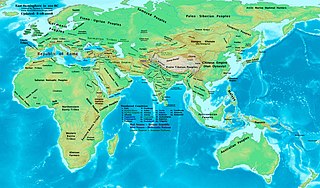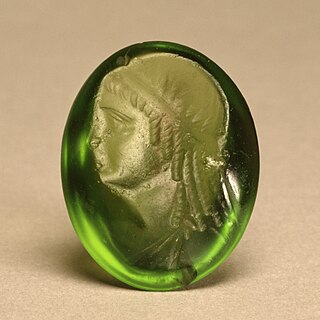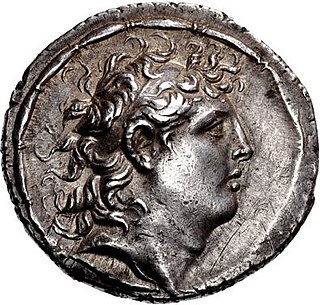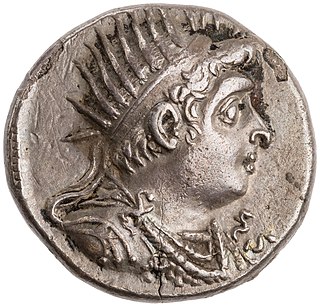Related Research Articles

Alexander I Theopator Euergetes, surnamed Balas, was the ruler of the Greek Seleucid kingdom in 150/Summer 152 – August 145 BC. Alexander defeated Demetrius I Soter for the crown in 150 BC. Ruling briefly, he lost the crown to Demetrius II Nicator during his defeat at the Battle of Antioch in Syria, dying shortly after. His reign marks the beginning of the disintegration of the Seleucid realm, with important eastern satrapies such as Media being lost to the nascent Parthian Empire.

The Ptolemaic dynasty, sometimes also known as the Lagids or Lagidae, was a Macedonian Greek royal family, which ruled the Ptolemaic Kingdom in Egypt during the Hellenistic period. Their rule lasted for 275 years, from 305 to 30 BC. They were the last dynasty of ancient Egypt.

The 1st century BC, also known as the last century BC, started on the first day of 100 BC and ended on the last day of 1 BC. The AD/BC notation does not use a year zero; however, astronomical year numbering does use a zero, as well as a minus sign, so "2 BC" is equal to "year –1". 1st century AD follows.

The 2nd century BC started the first day of 200 BC and ended the last day of 101 BC. It is considered part of the Classical era, although depending on the region being studied, other terms may be more suitable. It is also considered to be the end of the Axial Age. In the context of the Eastern Mediterranean, it is referred to as the Hellenistic period.
Year 48 BC was a year of the pre-Julian Roman calendar. At the time, it was known as the Year of the Consulship of Caesar and Vatia. The denomination 48 BC for this year has been used since the early medieval period, when the Anno Domini calendar era became the prevalent method in Europe for naming years.
This article concerns the period 109 BC – 100 BC.
This article concerns the period 119 BC – 110 BC.
This article concerns the period 139 BC – 130 BC.
This article concerns the period 149 BC – 140 BC.
Year 150 BC was a year of the pre-Julian Roman calendar. At the time it was known as the Year of the Consulship of Flamininus and Balbus. The denomination 150 BC for this year has been used since the early medieval period, when the Anno Domini calendar era became the prevalent method in Europe for naming years.
Year 204 BC was a year of the pre-Julian Roman calendar. At the time it was known as the Year of the Consulship of Cethegus and Tuditanus. The denomination 204 BC for this year has been used since the early medieval period, when the Anno Domini calendar era became the prevalent method in Europe for naming years.

Demetrius II, called Nicator, was one of the sons of Demetrius I Soter. His mother may have been Laodice V, as was the case with his brother Antiochus VII Sidetes. Demetrius ruled the Seleucid Empire for two periods, separated by a number of years of captivity in Hyrcania in Parthia, first from September 145 BC to July/August 138 BC, and again from 129 BC until his death in 125 BC. His brother Antiochus VII ruled the Seleucid Empire in the interim between his two reigns.

Ptolemy VI Philometor was a king of Egypt from the Ptolemaic period. He reigned from 180 to 164 BC and from 163 to 145 BC. The eldest son of Ptolemy V Epiphanes and Cleopatra I of Egypt, he came to the throne as a very young child in 180 BC and the kingdom was governed by regents: his mother until her death in 178 or 177 BC and then two of her associates, Eulaeus and Lenaeus until 169 BC. From 170 BC, his sister-wife Cleopatra II and his younger brother Ptolemy VIII Euergetes were co-rulers alongside him.

Cleopatra II was a queen of Ptolemaic Egypt who ruled from 175 to 116 BC with two successive brother-husbands and her daughter—often in rivalry with her brother Ptolemy VIII.

Diodotus or Trypho was a king of the Hellenistic Seleucid Empire. Initially an official under King Alexander I Balas, he led a revolt against Alexander's successor Demetrius II Nicator in 144 BC. He rapidly gained control of most of Syria and the Levant. At first he acted as regent and tutor for Alexander's infant son Antiochus VI Dionysus, but after the death of his charge in 142/141 BC, Diodotus declared himself king. He took the royal name Tryphon Autocrator and distanced himself from the Seleucid dynasty. For a period between 139 and 138, he was the sole ruler of the Seleucid empire. However, in 138 BC Demetrius II's brother Antiochus VII Sidetes invaded Syria and brought his rule to an end.

Cleopatra Thea surnamed Eueteria was the ruler of the Hellenistic Seleucid Empire. She was queen consort of Syria from 150 to about 125 BC as the wife of three Syrian kings: Alexander Balas, Demetrius II Nicator, and Antiochus VII Sidetes. She ruled Syria from 125 BC after the death of Demetrius II Nicator, eventually in co-regency with her son Antiochus VIII Grypus until 121 or 120 BC.

Ptolemy VIII Euergetes II Tryphon, nicknamed Physcon, was a king of the Ptolemaic dynasty in Egypt. He was the younger son of Ptolemy V Epiphanes and Cleopatra I Syra. His reign was characterised by fierce political and military conflict with his older brother Ptolemy VI Philometor and his sister Cleopatra II.

Cleopatra III was a queen of Egypt. She ruled at first with her mother Cleopatra II and husband Ptolemy VIII from 142 to 131 BC and again from 127 to 116 BC. She then ruled with her sons Ptolemy IX and Ptolemy X from 116 to 101 BC.
The Battle of Antioch or the Battle of the Oenoparus was an engagement that took place in 145 BC on the Oenoparus river. The battle saw the defeat and overthrow of Alexander Balas from the Seleucid throne by Ptolemy VI of Egypt.
This article concerns the period 99 BC – 90 BC.
References
- ↑ "Ptolemy VII Neos Philopator | king of Egypt". Encyclopedia Britannica. Retrieved January 15, 2021.
- ↑ "Sima Qian - China culture". Archived from the original on September 6, 2010. Retrieved June 28, 2010.